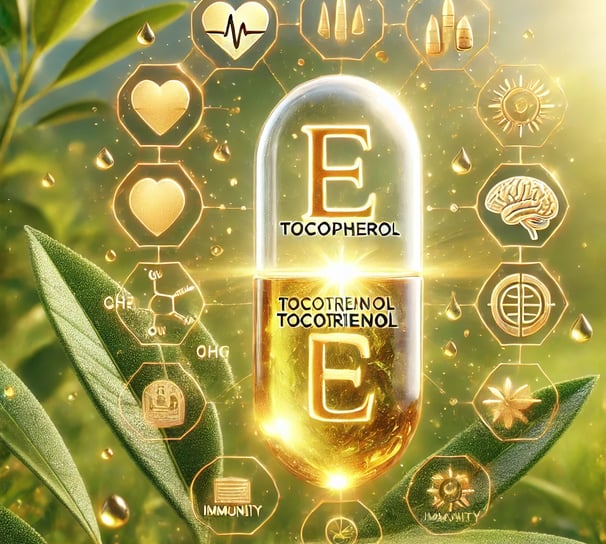AMAZING natural health products backed by research
Best Vitamin E And Why You Should Consider a Change
Are you taking vitamin E? Discover why you should consider a change and learn about the best vitamin E options available. Get answers to your questions about the benefits of vitamin E and find the perfect choice for your health needs.
AlexanderJ


The research paper titled "Tocopherols and Tocotrienols—Bioactive Dietary Compounds; What Is Certain, What Is Doubt?" published in the International Journal of Molecular Sciences provides a comprehensive review of the bioactive properties of tocopherols and tocotrienols, both of which are members of the vitamin E family. Below is a summarized review of the findings from the paper, focusing on the differences between tocopherols and tocotrienols in terms of their benefits and effects on health and wellbeing.
Structural Differences and Bioavailability of Tocotrienol
Tocopherols and tocotrienols share a common chromanol ring but differ in their side chains. Tocopherols have a saturated phytyl side chain, whereas tocotrienols possess an unsaturated farnesyl side chain, which results in different biological activities.
Bioavailability: The absorption of tocopherols and tocotrienols depends on the food matrix and other dietary components. Tocopherols, particularly α-tocopherol, are preferentially retained in the body due to the action of hepatic α-tocopherol transfer protein (α-TTP), leading to higher plasma and tissue concentrations. Tocotrienols, on the other hand, are less retained and are metabolized and excreted more rapidly.
Tocotrienol Antioxidant Activity
Both tocopherols and tocotrienols exhibit antioxidant properties, protecting cells from oxidative damage by scavenging free radicals. However, tocotrienols have been found to have a greater antioxidant potential compared to tocopherols due to their ability to be incorporated into cell membranes more efficiently, providing better protection against lipid peroxidation.
Tocotrienol Health Benefits
Cardiovascular Health: Tocotrienols, particularly γ-tocotrienol, have shown greater efficacy in lowering cholesterol levels compared to tocopherols. Tocotrienols inhibit the enzyme HMG-CoA reductase, which is crucial for cholesterol synthesis, whereas tocopherols have a minimal effect on cholesterol levels.
Anti-Cancer Properties: Tocotrienols have demonstrated significant anti-cancer properties, including anti-proliferative, pro-apoptotic, anti-angiogenic, and anti-inflammatory effects. These properties are more pronounced in tocotrienols than tocopherols, making tocotrienols a promising candidate for cancer prevention and treatment.
Neuroprotection: Both tocopherols and tocotrienols have neuroprotective effects, but tocotrienols, especially α-tocotrienol, show superior neuroprotection by protecting neurone from glutamate-induced toxicity, which is a key factor in neurodegenerative diseases such as Alzheimer's and Parkinson's.
Tocotrienol Metabolic and Inflammatory Effects
Tocotrienols exhibit better anti-inflammatory effects compared to tocopherols. They modulate various signaling pathways involved in inflammation and immune response, contributing to their protective role in metabolic disorders such as obesity and type 2 diabetes.
Tocotrienol Potential Clinical Applications
The review emphasizes the potential clinical applications of tocotrienols in preventing and treating chronic diseases, particularly cardiovascular diseases, cancer, and neurodegenerative disorders. The distinct biological activities of tocotrienols, such as their superior antioxidant, anti-inflammatory, and anti-cancer properties, make them more effective than tocopherols in these areas.
Tocotrienol vs Tocopherol Which is Better?
While both tocopherols and tocotrienols are important for maintaining health, tocotrienols offer a broader range of benefits, especially in the context of chronic disease prevention. The review suggests that tocotrienols should be considered more prominently in dietary supplements and functional foods, given their potent bioactive properties.
This analysis underscores the importance of considering both tocopherols and tocotrienols in dietary recommendations, with a growing body of evidence favoring the inclusion of tocotrienols for their enhanced health benefits.
References:
Tocopherols and Tocotrienols—Bioactive Dietary Compounds; What Is Certain, What Is Doubt?
By: Kacper Szewczyk et al. Institute of Human Nutrition Sciences, Warsaw University of Life Sciences (SGGW-WULS), 159C Nowoursynowska Street, 02-787 Warsaw, Poland (2021)
